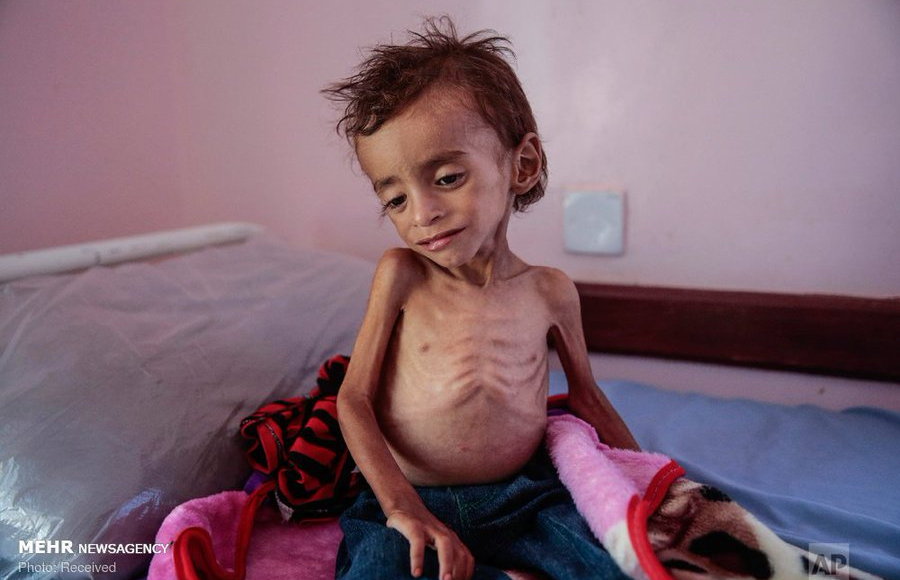Since the beginning of the aggression against Yemen in March 2015, the US-led coalition of aggression imposed a sea and air blockade on Yemen, and put restrictions on the flow of food, fuel, and medicine to civilians, in violation of international humanitarian law. It is also practicing piracy on cargo and fuel ships by seizing them and preventing their entry to the country, which led to catastrophic effects in Yemen.
The coalition of aggression caused the largest famine in the twenty-first century in Yemen. Because of the unjust blockade on all the state's ports, and the destruction of all infrastructure, in addition to the ignorance of the United Nations, whose presence reached the point of making conspiracies against the Yemeni people. The UN failed to intervene and prevent piracy and detention of oil and cargo ships, despite their full inspection and giving them permits to enter the country.
Piracy on oil vessels:
The aggression coalition detains fuel ships heading to the port of Hodeidah, and these ships are stopped before leaving international waters in the Red Sea. The US-backed Saudi aggression has made checkpoints made of dozens of blockade ships and American navies to seize any ship they desire, without any justification.
The aggression coalition is holding fuel ships after stopping them from international waters while on their way from the port of Djibouti after being inspected by the UN office, so they get granted access licenses to the port of Hodeidah.
Since 2018, Yemen has been experiencing a suffocating fuel crisis that almost does not stop, the victim of which was the Yemeni civilans, as the suffocating fuel crisis affected all aspects of life, threatening access to food, operating hospitals and water supplies that depend on fuel and are essential to saving lives and limiting the spread of infectious epidemics.
This also resulted in a black market for fuel, which sells fuel in very high price, sometimes reaching three times or more than the official price, and the suffocating fuel crisis negatively impacted the reality of citizens’ lives through the rise in prices resulting from the high transportation costs, and the difficulty of transportation as a result of the high transportation fare. In addition, the impact negatively reached the agricultural sector, resulting in some of the water pumps that supply large areas of agricultural lands with water to stop due to lack of fuel. In regard to the health sector, some hospitals stop working on a daily basis for some hours.
The oil derivatives crisis also negatively affected the electricity stations, and the fuel crisis negatively affected livelihoods and imposed pressures that lead to raising the prices of food, water and other basic commodities, which exacerbates the already difficult humanitarian situation, as raising fuel prices leads to doubling the increase in food prices due to the economic situation degenerate.
The catastrophic situation in which the Yemeni people live:
To convey the picture of the disastrous situation that the Yemeni people are experiencing as a result of the US-Saudi-Emirati aggression, without anyone being able to question its credibility; The United Nations website was chosen as a source to convey the news of the catastrophic suffering experienced by the Yemeni people in all details, as the United Nations agencies warned that the severe hunger crisis in Yemen had reached the brink of direct disaster, after today (17.4) million people are in need of food assistance. In addition, a growing segment of the population suffers from dangerous levels of hunger, two out of three Yemenis require humanitarian assistance to survive—the equivalent of 20 million people.
The Food and Agriculture Organization of the United Nations, the World Food Program and the United Nations Children's Fund (UNICEF) warned, following the issuance of the Integrated Classification of Food Security Phases analysis in Yemen, that the humanitarian situation is expected to worsen in the country during the period between June and December 2022, with the possibility that the number of people who will be unable to meet their minimum food needs in Yemen will rise to 19 million in that period.
New assessments revealed by the United Nations humanitarian associates in Yemen at the country level confirmed that (23.4) million people require assistance, including (19) million people who will go hungry in the coming months, and more than (160,000) of these people will face famine-like conditions.
High rates of poverty
Yemen depends on imported fuel, food, and medicine, with approximately 80 to 90 percent of the population's is in daily need of them. In return, the US-led aggression coalition is besieging Yemen; While the United Nations says that Yemen is facing the worst humanitarian crisis in the world, the aggression coalition continues to besiege Yemen in full view of the United Nations itself, and with the supervision, support and complicity of the international community.
The UN Under-Secretary-General for Humanitarian Affairs, Martin Griffiths, indicated that Yemen relies on commercial imports for about 90 percent of its food, and almost all of its oil and basic commodity imports.
According to the reports of the United Nations and its affiliated organizations, the aggression, and the blockade have led to nearly 80% of the population falling into poverty, while 10 million people are one step away from starvation, as the World Bank estimated that between 71% and 79% of Yemenis (about 21 million people) were included under the poverty line at the end of 2021.
The figures speak of the lack of 28 million Yemenis of the necessities of life such as water, electricity, health and education, and 24 million citizens need humanitarian aid, of whom 12 million are in dire need of such aid.







